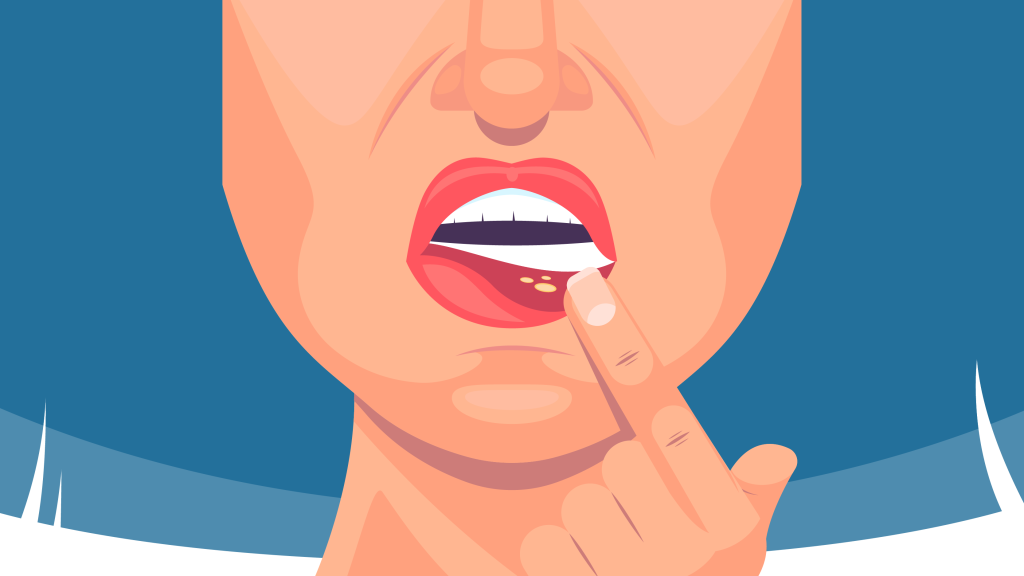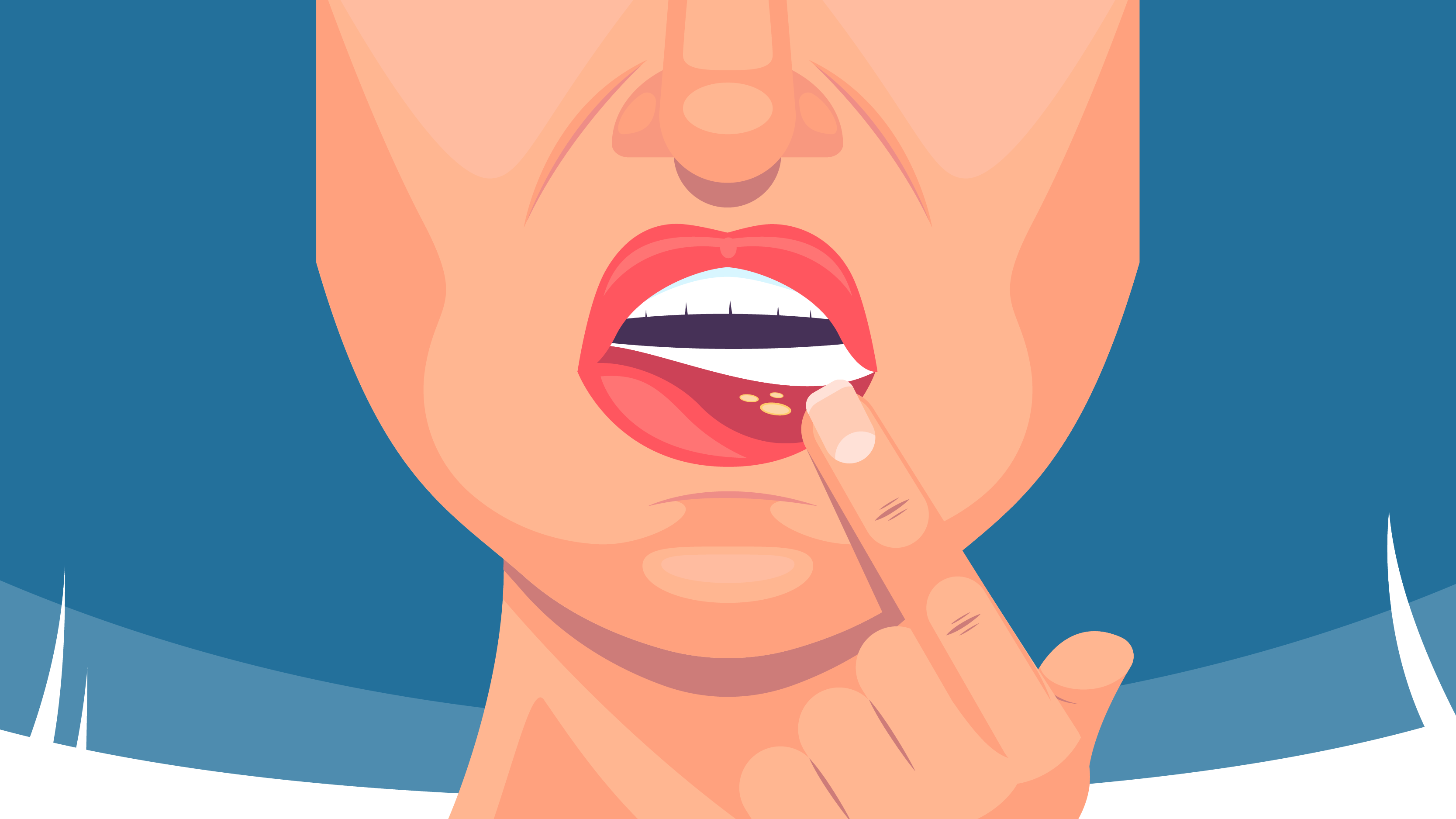
What Do Oral Ulcers Entail?
Ulcers, those bothersome mouth sores that appear inside the oral landscape, cause a wave of discomfort and are sometimes accompanied by a specific palette of yellow or red hues. These oral ulcers, unlike their exterior counterparts, cold sores, which are caused by viral activity on the outside lips, carve their presence inside the mouth.
Read More – Sweet Limes: A Fruit With Potent Health Advantages
The discomfort they cause isn’t just physical; it’s a reminder of the complex dynamics that exist inside our mouth environment. These sores, despite their modest size, can cause significant pain, making daily functions like eating and speaking difficult.
Their unusual coloration, which features shades of yellow or red, adds a visual component to the discomfort. It serves as a reminder that even the most modest changes within our bodies can become visible.
It’s critical to distinguish between these mouth ulcers and cold sores because they’re caused by distinct things. While cold sores are caused by viral infections, these ulcers are frequently related to stress, dietary deficits, or small oral injuries.
Understanding these nuances becomes a critical compass for navigating the world of oral health. The yellow or red ulcers may be minor in size, but their influence is felt, pushing people to pay attention to the details of their dental health.
Factors
A single mouth ulcer is typically the result of injury from biting the tongue or cheek, from sharp teeth, from cleaning, or from wearing dentures that are too small. We refer to these ulcers as “traumatic” ulcers. Referred to as “recurrent aphthous stomatitis,” this condition is characterized by recurrent mouth ulcers.
Mouth Ulcers can result from a variety of causes, such as:
- Biting your cheek inside out by mistake.
- Damage caused by a toothbrush (e.g., slipping when brushing).
- Persistent brushing against crooked, pointy, or damaged teeth.
- Persistent rubbing of braces or dentures.
- Heat-related burns from eating.
- Irritation is caused by powerful antiseptics, like mouthwash.
- Ulcers aphthous.
- Viruses like the herpes simplex virus cause cold sores.
- Response to specific drugs.
- Oral skin rashes (lichen planus, for example).
- Illnesses caused by antibodies.
- Iron, folate, or vitamin B2 deficiencies underlying.
- Underlying digestive illness, such as celiac disease or Crohn’s disease.
- Tongue cancer.
- Extreme exhaustion, illness, or stressful times can exacerbate ulcers.
Symptoms
Depending on the underlying cause, mouth ulcer symptoms might include:
- One or more ulcers on the area of the mouth’s mucous membrane that hurts.
- Red, swollen mucous membrane surrounding the lesions.
- Difficulty brushing your teeth or chewing due to the pain.
- Meals that are sour, spicy, or salty cause painful irritation.
- Mouth splints, orthodontic aligners, or dentures that irritate the sores.
- Sometimes an ulcer isn’t even painful. When someone has oral cancer, this can happen.
How can I tell if I have an ulcer caused by trauma?
Traumatic ulcers typically appear on their own, are located close to the site of injury, and disappear when the underlying cause is treated.
What symptoms indicate a recurrent case of aphthous stomatitis?
Recurrent aphthous stomatitis, or the recurrent development of mouth ulcers in otherwise healthy children and adolescents, is a prevalent issue. It is not contagious and is not expected to be inherited, yet the etiology remains unknown.
Are recurrent mouth ulcers classified into any particular type?
The most prevalent type is mild ulcers. In addition to the lips, tongue, and gums, they can also develop inside the cheeks and, less frequently, on the roof of the mouth. These ulcers can occasionally occur in groups and are typically the size of the tip of a pencil. Four to six are available at any given moment.
Larger ulcers can heal more slowly and with greater severity. If an ulcer persists for more than three weeks, you should see your dentist. Huge ulcers that hurt a lot, especially when swallowing, can develop close to the tonsils. Usually, you only receive one at a time.
Additionally, up to 100 tiny, excruciating ulcers that last one to two weeks may develop. These final two kinds are extremely uncommon, though.
You can get ulcers in other bodily areas, such as your genitals or eyes. You must inform your dental professionals of this.
Which less frequent reasons lead to oral ulcers?
Mouth Ulcers can result from infections. Children and certain people with herpes simplex frequently develop mouth ulcers. Mouth ulcers can also be caused by other, less frequent viral and bacterial infections, however, this is uncommon. Anemia, various blood illnesses, some gastrointestinal or skin conditions, and possibly other blood problems can all result in mouth ulcers. Sometimes the only indication of an underlying illness is mouth ulcers.
When Should You Get Treatment For Mouth Ulcers?
If your regular daily activities are being hampered by ulcers, or if they have been present for more than two weeks, consult your dentist or an Oral Medicine Specialist.
Blood testing may be required in some circumstances if an underlying deficit (such as iron, folate, or vitamin B insufficiency) or an inflammatory medical disease is suspected.
If your oral health expert is unable to pinpoint the origin of your mouth ulcers, or if the ulcers do not respond to standard treatments, you may require a biopsy of part of the ulcer and some surrounding tissue. A biopsy is a technique that involves the removal of a tissue sample for examination and diagnosis.
Mouth Ulcer Treatment
Most mouth ulcers are harmless and heal on their own in 10 to 14 days. Other types of mouth ulcers, such as aphthous, herpes simplex, or skin rashes in the mouth, require topical treatment (such as a mouthwash, ointment, or gel).
Although ulcer recovery cannot be accelerated, symptoms can be treated, and the risk of complications avoided.
Mouth Ulcers Treatment Methods Include:
- Until the ulcers heal, avoid spicy, salty, and sour foods.
- Drink plenty of water.
- Keep your mouth as clean as possible.
- On the ulcers, use antibacterial gel.
- Rinse your mouth with warm, mildly salted water, remaining in your mouth for up to 4 minutes.
- Use an alcohol-free medicated mouthwash (ideally containing chlorhexidine gluconate) twice a day.
- Use an alcohol-free steroid mouthwash or ointment as directed by your dentist or Oral Medicine Specialist.
- Immunosuppressant medication may be administered by your oral health professional or a medical specialist in extreme circumstances.
Finally, oral ulcers, those annoyances within the mouth’s sensitive topography, create a complicated symphony of discomfort that is frequently painted in yellow or red. Unlike exterior cold sores, these sores penetrate the inner oral realm, having an unexpectedly strong impact on daily tasks such as eating and speaking.
The various reasons that contribute to these ulcers, ranging from traumatic causes to underlying health issues, illustrate the complexities of oral health. Symptoms range from pain and swelling to food sensitivity, emphasizing the complex ways in which these ulcers emerge.
Navigating this terrain necessitates recognizing the various types of oral ulcers, comprehending their causes, and obtaining suitable therapy. While most ulcers heal on their own, recurring episodes or those that last longer than two weeks require medical care.
Read More – 7 Medically Proven Health Advantages Of Vitamin C
Treatment treatments, ranging from topical medications to lifestyle changes, emphasize the necessity of proactive oral care.
Finally, mouth ulcers act as silent messengers, communicating not just discomfort but also probable underlying problems. Listening to these signs, seeking prompt help, and practicing good dental hygiene all play important roles in maintaining a harmonious oral environment. We may untangle the complexity of oral health via awareness and care, promoting a balance in which discomfort gives way to healing and well-being.
Read More – The Delightful Health Advantages Of Dates



